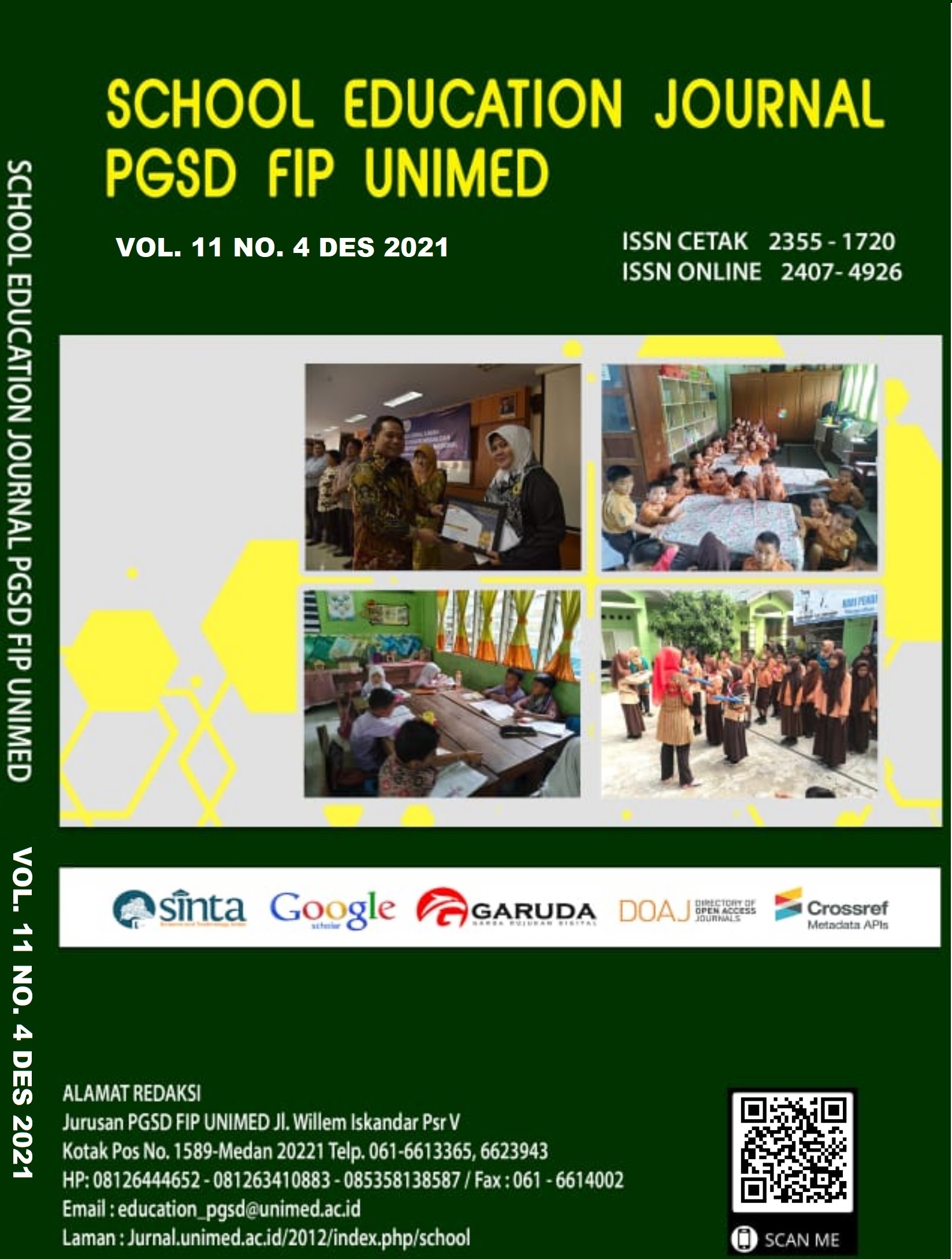PENGARUH DISIPLIN BELAJAR SISWA TERHADAP HASIL BELAJAR MATEMATIKA DI KELAS TINGGI SD NEGERI KELURAHAN PALANRO KABUPATEN BARRU
DOI:
https://doi.org/10.24114/sejpgsd.v12i4.40529Keywords:
Learning Discipline, Learning Achievement Mathematics, High-GradeAbstract
This study is a quantitative survey method which aims to determine whether there is an influence of learning discipline on the learning outcomes of high grade students of SD Negeri Palanro Village. Learning discipline is the independent variable, while the learning achievement of mathematics are the dependent variable in this study. The population in this study were the high-class students of SD Negeri Palanro, Barru Regency, totaling 120 students, while the sample was 95 students. The research data collection technique used a questionnaire and mid-semester test scores for odd semester mathematics subjects for the 2021/2022 academic year. The data analysis technique used is simple linear regression analysis and significance test. Based on the results of the descriptive analysis, the learning discipline was classified as very good with a percentage of 62.1% and the students' mathematics learning outcomes were classified as good with a percentage of 60%. From the results of inferential analysis obtained the value of sig. 0.020 < 0.05 or H0 is rejected and H1 is accepted, which means that learning discipline has a positive and significant effect on students' mathematics learning outcomes.References
Akmaluddin, & Haqiqi, B. 2019. Kedisiplinan Belajar Siswa di Sekolah Dasar (SD) Negeri Cot Keu Eung Kabupaten Aceh Besar (Studi Kasus). Jurnal of Education Science (JES), 5(2), 1“12. https://doi.org/10.3314/jes.v5i2.467
Aslianda, Z., Israwati, & Nurhaidah. 2017. Hubungan Disiplin Belajar terhadap Hasil Belajar Siswa. Jurnal Ilmiah Pendidikan Guru Sekolah Dasar, 2(1), 236“243. https://jim.unsyiah.ac.id/pgsd/article/view/2552
Bagus, B. 2014. Peningkatan Hasil Belajar Pembelajaran Ilmu Pengetahuan Alam Menggunakan Media Audio Visual di Sekolah Dasar. Skripsi. Pontianak: Universitas Tanjungpura.
Elly, R. 2016. Hubungan Kedisiplinan Terhadap Hasil Belajar Siswa Kelas V di SD Negeri 10 Banda Aceh. Pesona Dasar (Jurnal Pendidikan Dasar Dan Humaniora), 3(4), 43“53. https://jurnal.unsyiah.ac.id/PEAR/article/view/7540
Handayani, E.S.,& Subakti, H. 2021. Pengaruh Disiplin Belajar terhadap Belajar Bahasa Indonesia di Sekolah Dasar. Jurnal Basicude. Vol 5(1):151-164. https://doi.org/10.31004/basicedu.v5i1.633
Mujiati. 2012. Korelasi antara Kedisiplinan Peserta Didik dengan Hasil Belajar pada Mata Pelajaran Biologi Siswa Kelas X M. A. Hidayatus Syubban Semarang Tahun Pelajaran 2012/2013. Jurnal Inovasi Penelitian, 2(4), 17“18.
Mukhid, A. 2021. Metodologi Penelitian Pendekatan Kuantitatif. Surabaya: Jakad Media Publishing.
Nisa, F., Fathurohman, I., & Setiawan, D. 2021. Karakter Kedisiplinan Belajar Anak SDN 2 Muryolobo pada Masa Pembelajaran Daring. Jurnal Inovasi Penelitian, 2(4), 1179“1186. https://doi.org/10.47492/jip.v1i4.754
Pasinggi, Y. S., & Zainal, Z. 2018. Pendidikan Matematika I Bilangan, Faktor dan Kelipatan Persekutuan. Makassar: Badan Penerbit Universitas Negeri Makassar.
Santoso, M. 2015. Korelasi Penggunaan Media, Disiplin Belajar dan Motivasi Belajar terhadap Prestasi Belajar IPS. Cendekia: Journal of Education and Teaching, 9(2), 149.
Triwinarni, D., Fauzi, & Monawati. 2017. Pengaruh Kecerdasan Logika Matematika terhadap Kedisiplinan Belajar Siswa Kelas V SD Negeri 1 Pagar Air Kabupaten Aceh Besar. Jurnal Ilmiah Pendidikan Guru Sekolah Dasar, 2, 16“29.
Downloads
Published
Issue
Section
License
Authors whose manuscripts are approved are approved as follows:
The publication rights for all journal manuscript materials published/published on the SEJ (School Education Journal) E-Journal site are held by the editorial board with the author's knowledge (moral rights remain with the manuscript authors).
The formal legal requirements for accessing this electronic digital journal article are subject to the terms of the Creative Commons Attribution-ShareAlike (CC BY) license, which means that E-Journal SEJ (School Education Journal) has the right to store, transfer media/format, manage in the form of a database, maintain, and publish articles without asking permission from the author as long as the author's name remains as the copyright owner.
Manuscripts published/published electronically are open access for educational, research, and library purposes.

